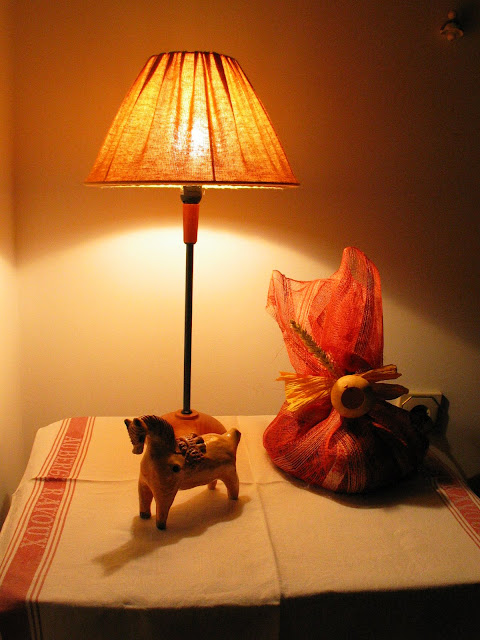Dear friends,
Today I have a guest writer, my dear friend Antonia. Native German, she lives in New York City, where she teaches at CUNY.
Enjoy, Pegaz :)
---
 I just came back from a wonderful week in Slovenia, spent with great friends and their friends, in its capital with a name that sounds like that of a beautiful woman. We had a fantastic time: Hiding from the atrocious heat in the shade by lying in lazy chairs enjoying ice-cream and lemonade. Canceling running dates and going to the swimming pool instead. Exploring the city in the coolness of the night, walking and talking, sipping delicious Slovenian wine and discussing live and love and the absence of morals in world politics while strolling under willow trees. But amidst all of this beauty and lightness, one subject seemed to come up over and over again, wherever we went and whomever we met: prostitution.
I just came back from a wonderful week in Slovenia, spent with great friends and their friends, in its capital with a name that sounds like that of a beautiful woman. We had a fantastic time: Hiding from the atrocious heat in the shade by lying in lazy chairs enjoying ice-cream and lemonade. Canceling running dates and going to the swimming pool instead. Exploring the city in the coolness of the night, walking and talking, sipping delicious Slovenian wine and discussing live and love and the absence of morals in world politics while strolling under willow trees. But amidst all of this beauty and lightness, one subject seemed to come up over and over again, wherever we went and whomever we met: prostitution. How so, you ask? I think it all started with one friend mentioning that “some French guy” had once told her that for him, all Slovenian women look, or dress, “like prostitutes”. She was upset about it, of course, and rightly so. Not only is this a macho, sexist comment indicating that specific ways of dressing and public appearance become automatically attached to certain moral norms about (improper, female) behavior and presentation. It goes like this: if you dress in this manner you are indicating to the world around you that you are available: for sex, for sex for money, for whatever people associate with that dress code. This judging according to appearance or behavior is a very common way people look at and categorize other people, especially minorities, and especially women. But that doesn’t mean it’s right or accurate or just. – Besides its sexist nature, the French man’s remark pointed to *Slovenian* women specifically, as explicit examples of that apparently immoral behavior – a generalization and ultimately stigmatization that calls for resistance wherever it shows up!
Nevertheless, the next thing we did – from the comfortable outlook of our lazy chairs and bar stools – was starting an investigation into the dress code of Slovenian women: do they run around like hussies, wearing mini skirts and shirts that show legs and décolleté and whatever else you associate with women who want to sell sex? – Surely, we found all that, in varying styles and combinations and on various levels. However, I am certain that most of it was due to the hovering heat wave that kept half of Europe in its clasp during that time and that a similar investigation in Paris or Lisbon would have produced comparable results. So, nothing particularly “prostitute” about Slovenian women!
But there is something else that formed the actual basis of this peculiar inquiry; a question that we didn’t discuss at the time: How does a prostitute look like? How do we know somebody is a prostitute, i.e. wants to sell sex for money, and – as important – how do we know somebody is not?!? Is there a particular “professional dress code” for prostitutes? And what does it mean if women, if prostitutes or not, dress according to that image? …
Many people would be able to list the things that serve as indicators for somebody being a prostitute; I don’t have to list them here in detail. What most people are not aware of is the fact that this stereotypical idea is based on the image of one type of prostitutes: street walkers. The reason being that they are the most visible: alongside transit highways, in famous red-light districts, on dark, abandoned streets in industrial areas. Because that is the way prostitutes – and “sluts”, for that matter – become portrayed in movies and TV shows; just think of Pretty Woman and Samantha in Sex and the City. What stays invisible through this imagery are the other types prostitutes that do exist: escorts, call girls, dominatrix, male or transsexual prostitutes… -- you name it.
Visible or invisible, “real” prostitute or “just” slut, there is one thing they all share: stigmatization. There are only a few people who proudly carry any of these labels, or who disclose their sex work activities to their families, friends, or colleagues. Why? Again, for many people that seems to be an obvious question with an obvious answer: because it’s morally *wrong* to sell your body for sex, or sometimes just to be promiscuous, esp. as a woman (just remember the good girl – bad girl paradox, or the double standards applied to promiscuous men and women…). Without elaborating too much on the latter (that’s worth its separate blog entry!!), let’s just have a quick, more philosophical look at the first.
Before that, it might be time for me to mention here that yes, part of the reason why I know all of these fact and figures is somewhat professional expertise, but of a different kind than you might think now: for my PhD thesis in sociology, I do research on the prostitution rights movement in different countries and trying to answer questions like those raised above is basically part of my everyday research. I also teach a class called “Sex Workers Rights Movements” at a college in New York City – and I always enjoy that first class of the semester when I ask my students similar questions, trying to push them further in the inquiry of their own morals, assumptions, the stereotypes and the “truths” they hold on to.
So, then, why is it morally wrong to sell sex for money? Looking behind common responses like “it’s dirty and disgusting”, “I would never be able to do it”, or “the Bible says…” you will find that many people hold the strong belief that the body, and often sex, is something ‘sacred’ (not necessarily in a religious sense), something that shouldn’t be sold for money, something that should be handled like a gift (if from god, or nature, or life...). Selling something so personal, sacred, private like sex for money seems like selling your body, selling yourself – what is inherently, morally, ethically wrong. That’s the reason why for many, for example, suicide as well as trading human organs is a crime, or at least something immoral, unethical, unjustifiable. Hence: prostitution is bad, should be illegal, eradicated. Or, from a more liberal position: since we can’t totally dispose of it – it’s the oldest profession anyway, right? – let’s just hope MY daughter never ends up on those streets!
(my response to that: Ever heard of NIMBY? Check: http://en.wikipedia.org/wiki/Nimby)
When studying the sex workers’ rights movement, I meet women (and men, for that matter) who have nothing to do with either the stereotypical picture of a street prostitute in black high-heel boots and silver hot pants who tries to support her drug habit, nor the captivated, intimidated trafficking victim that is sold to random men by her pimp. On the contrary, these are sex workers (to finally introduce the term that is used in activist circles for people working in the sex industry) who have chosen their way of making money for various reasons but always independently and autonomously. People who painfully experience the stigmatization of their profession and who decided to stand up against political and social discrimination, police brutality, rape, abuse, secrecy due to stigma and rejection.
That is not to say that there is no trafficking, child prostitution, teenagers who sell their bodies for the next shot in a dark corner. Nobody, and I repeat: nobody (except for people profiting from it, maybe) would ever contend that these things are just or right or ethically justifiable. But I do agree with activists in these movements who argue that there is a difference between ‘voluntary’ and ‘forced’ prostitution, and therefore they should enjoy a different ethical, legal, political, and social status. That there are women and men who choose to sell sexual services for (often good!) money and who don’t feel that they should be discriminated against for that choice. People fighting for the decriminalization of prostitution ask for pretty basic human and civil rights: fair and just treatment, protection from abuse and oppression, freedom of choice and the right to your own body, the right to join professional associations etc. As granted, for example, in the Netherlands (since 1988) and Germany (since 2002) where prostitution is decriminalized; i.e. prostitutes can open their own businesses, get health insurance and pension plans, are allowed to join a union – and have to pay taxes, of course…
(Sweden is an interesting “counter-example”, where the *buying* of sexual services was criminalized while it remains legal to sell sex. A socialist response to patriarchy and the immorality of selling sex in a free world. And the subject for another blog entry! If interested, more about that here: http://www.swop-usa.org/news/Swedish_critique_world_news.php)
When trying to find facts and figures about the situation of prostitution and prostitutes in Slovenia – and I admit, I only tried the google information highway – I came across contradictory information. One author claims that prostitution is legalized since 2003 (see http://slonews.sta.si/index.php?id=976&s=41), while a US report on “Human Rights Practices” in Slovenia states in 2006:
“Prostitution is illegal, but the government did not actively enforce this prohibition. Antitrafficking authorities and NGOs informally estimated that as many as 80 bars and clubs across the country could be engaged in facilitating or promoting prostitution.” (see: http://www.state.gov/g/drl/rls/hrrpt/2006/78839.htm).
Mh. Anybody our there in the Slovenian world who can enlighten me? I’d love to know…
At the end of this essay the question remains: how do we know somebody is a prostitute, and how do we know somebody is not? But to be honest: I hope that after reading the last few paragraphs it has become rather obsolete; replaced instead by the question why it still remains a point of inquiry in many situations, even in Germany and the Netherlands.
Prostitutes and non-prostitutes of the world, unite! :)
From Antonia, a German transplant in New York who is happy to count Andrej as one of her best friends!
Tell me what you think: avette[AT]gmx.net
For more arguments for the decriminalization of prostitution: http://www.ffeusa.org/html/statements/statements_prostitution.html
Prostitution rights organizations and projects:
http://www.swop-usa.org/index.php
http://www.tampep.com/
http://sexworkmatters.net/
http://www.spreadmagazine.org/index.html
http://www.chezstella.org/stella/?q=en/
http://www.nzpc.org.nz/
http://www.sexworkersproject.org/
http://www.hydra-ev.org/
 Treba je najti svoje sanje, potem postane pot lahka. Vendar pa ni sanj, ki bi trajale kar naprej, vsake sanje zamenjajo druge sanje in ne smemo si želeti, da bi katere obdržali za zmeraj."
Treba je najti svoje sanje, potem postane pot lahka. Vendar pa ni sanj, ki bi trajale kar naprej, vsake sanje zamenjajo druge sanje in ne smemo si želeti, da bi katere obdržali za zmeraj."

